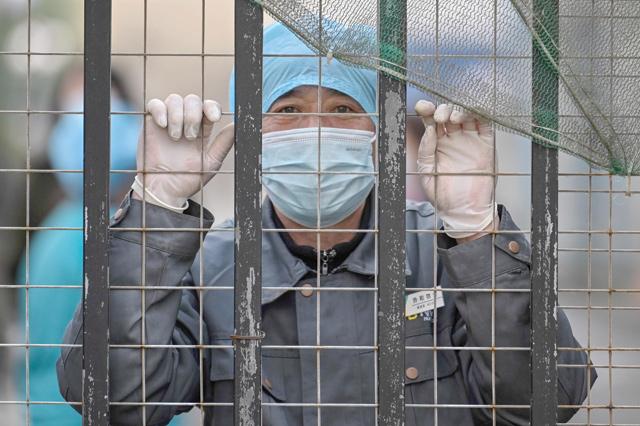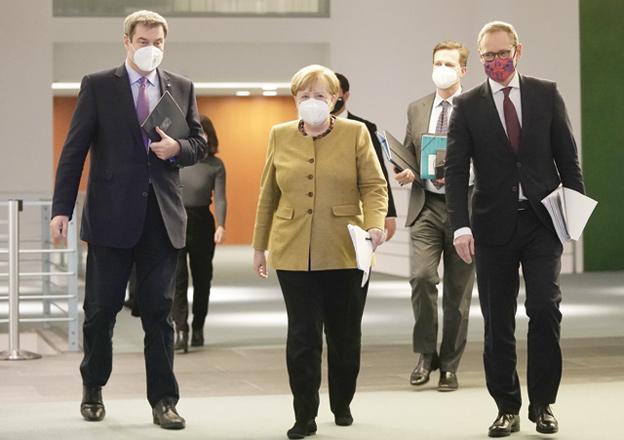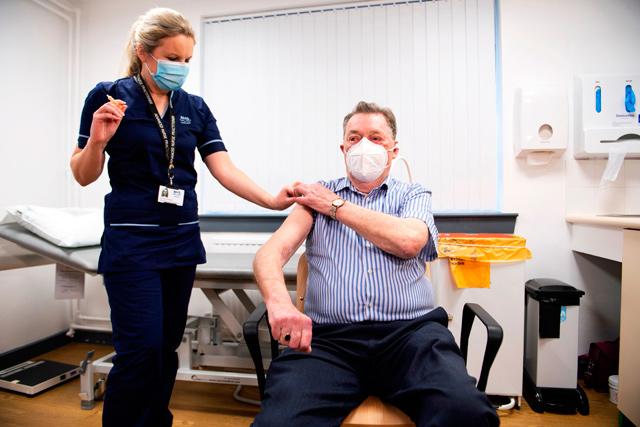You are here
WHO team visits Wuhan lab as world pins hopes on vaccines
By AFP - Feb 03,2021 - Last updated at Feb 03,2021

A worker wearing a face mask looks out from an entrance of a hospital towards the Wuhan centre for disease control and prevention, after members of the World Health Organisation team investigating the origins of the COVID-19 coronavirus arrived at the centre, in Wuhan, China's central Hubei province, on Monday (AFP photo)
WUHAN, China — World Health Organisation (WHO) experts on Wednesday inspected a Chinese laboratory in Wuhan that some US officials said could have been the source of the coronavirus, as countries around the world pin their hopes on vaccines as a way out the pandemic.
Russia is working to increase production of its Sputnik V jab in foreign countries after a report showed strong results for it.
And British pharmaceuticals giant GlaxoSmithKline and German biotech firm CureVac said they were teaming up to jointly develop a vaccine with the potential to counter multi-variants of COVID-19.
Vaccines are seen as the only way out of the pandemic that has infected nearly 104 million, left more than 2.2 million dead and devastated the global economy.
A WHO team searching for clues about the virus' origins went to the Wuhan Institute of Virology, where the virus was first detected.
Peter Daszak, one of the experts, tweeted that the team had an "extremely important meeting today with staff" and a "frank, open discussion".
Nevertheless, top WHO officials, including members of the team, have played down the chances of finding definitive answers on the trip, including how the virus jumped from animals to humans.
"It is very unlikely that [on] such a short mission, [we] would have a very advanced understanding or definite answers" about the origins of the virus, WHO team member Hung Nguyen-Viet told AFP from Wuhan.
The trip follows months of calls led by the United States for an independent, transparent probe into how the disease exploded into a once-in-a-century pandemic.
One theory circulated in the early days of the pandemic — pushed by then-president Donald Trump and some officials in his administration — was that the virus had leaked from the high-security lab in Wuhan, though there has been no evidence of it.
Sputnik V boost
Hopes for ending the pandemic were boosted by the publication of final-stage trial results showing that Russia's Sputnik V vaccine is 91.6 per cent effective against symptomatic COVID-19 cases.
Russia and several other countries rolled out the vaccine last year, amid scepticism about its quality and concerns that it had been rushed.
But the results published in The Lancet, a leading medical journal, put it at par with Western-developed vaccines.
“In the very near future there are plans to establish production in foreign countries, which will satisfy the demand from more and more countries,” Kremlin spokesman Dmitry Peskov told reporters.
Sputnik V has the advantage of being relatively cheap and can be stored at normal refrigerator temperatures, unlike the below-freezing storage required for shots from Pfizer and Moderna.
Spain said it was “open” to using Sputnik V if it is approved by European regulators.
German Chancellor Angela Merkel, citing “good data” for the Russian jab, said “every vaccine is welcome in the European Union”.
But in Britain, a spokesman for Prime Minister Boris Johnson dodged questions as to why he was mum on Sputnik V, despite previously being quick to hail the success of rival jabs.
“Our focus is on now getting those vaccines that we’ve ordered out to people as soon as they’ve been deemed safe and effective, and they have passed all the trials,” Johnson’s spokesman told reporters.
At the same time, a study showed that Britain’s own Oxford-AstraZeneca vaccine — which has come under scrutiny over its effectiveness for elderly people — significantly reduces virus transmission and is highly protective after a single dose.
“It slows transmission by around two-thirds, so it categorically supports the strategy that we’re undertaking,” Health Secretary Matt Hancock told BBC radio.
‘Quasi-ineffective’?
Although the European Medicines Agency recommended the AstraZeneca jab for adults of all ages last week, several countries have advised against administering it to older people.
Germany has said it will not advise over 65s to get it, Italy also recommended alternatives for people aged over 55 and Poland has authorised its use for under-60s only.
In France, where President Emmanuel Macron said last week that the AstraZeneca jab was “quasi-ineffective”, a lab will start producing a rival vaccine by US firm Moderna.
And another French lab will begin making the Pfizer-BioNTech vaccine in April, said Industry Minister Agnes Pannier-Runacher.
Macron pledged on Tuesday that four French sites would begin making vaccines soon, as the government drew sharp criticism over an inoculation drive that has started slowly.
French pride has also taken a hit after its pharma giant Sanofi said its COVID vaccine would not be ready until later this year.
Further adding to global supply, China said it plans to provide 10 million doses of COVID-19 jabs to the WHO-backed international vaccine distribution programme Covax.
Related Articles
LONDON — Britain closed its schools on Tuesday ahead of a new national lockdown, with Germany set to extend its own restrictions as Europe b
LONDON — Britain on Monday began rolling out the Oxford-AstraZeneca coronavirus vaccine, a possible game-changer in fighting the disease wor
AMMAN — The Jordan Food and Drug Administration (JFDA) on Wednesday announced that Russia’s Sputnik COVID-19 vaccine was approved for emerge

















